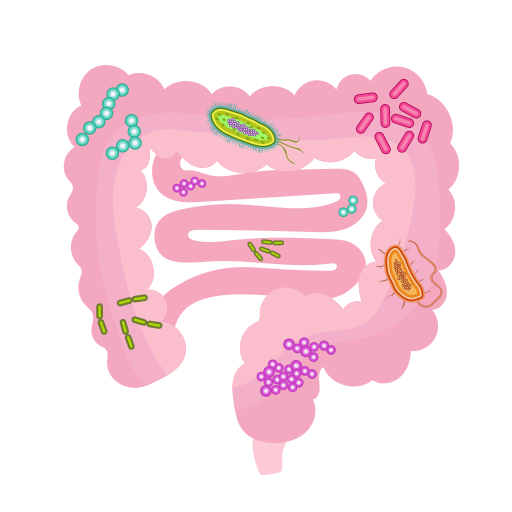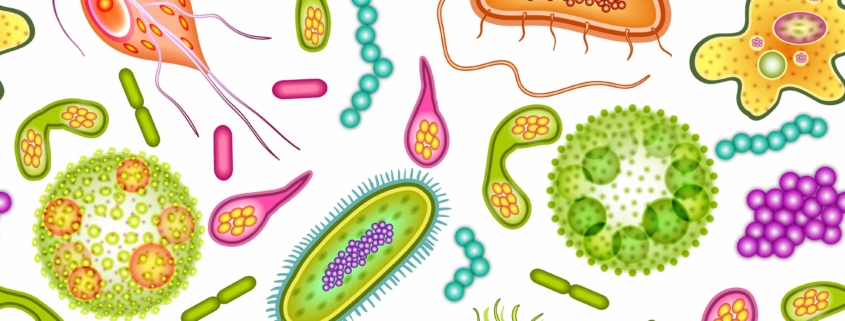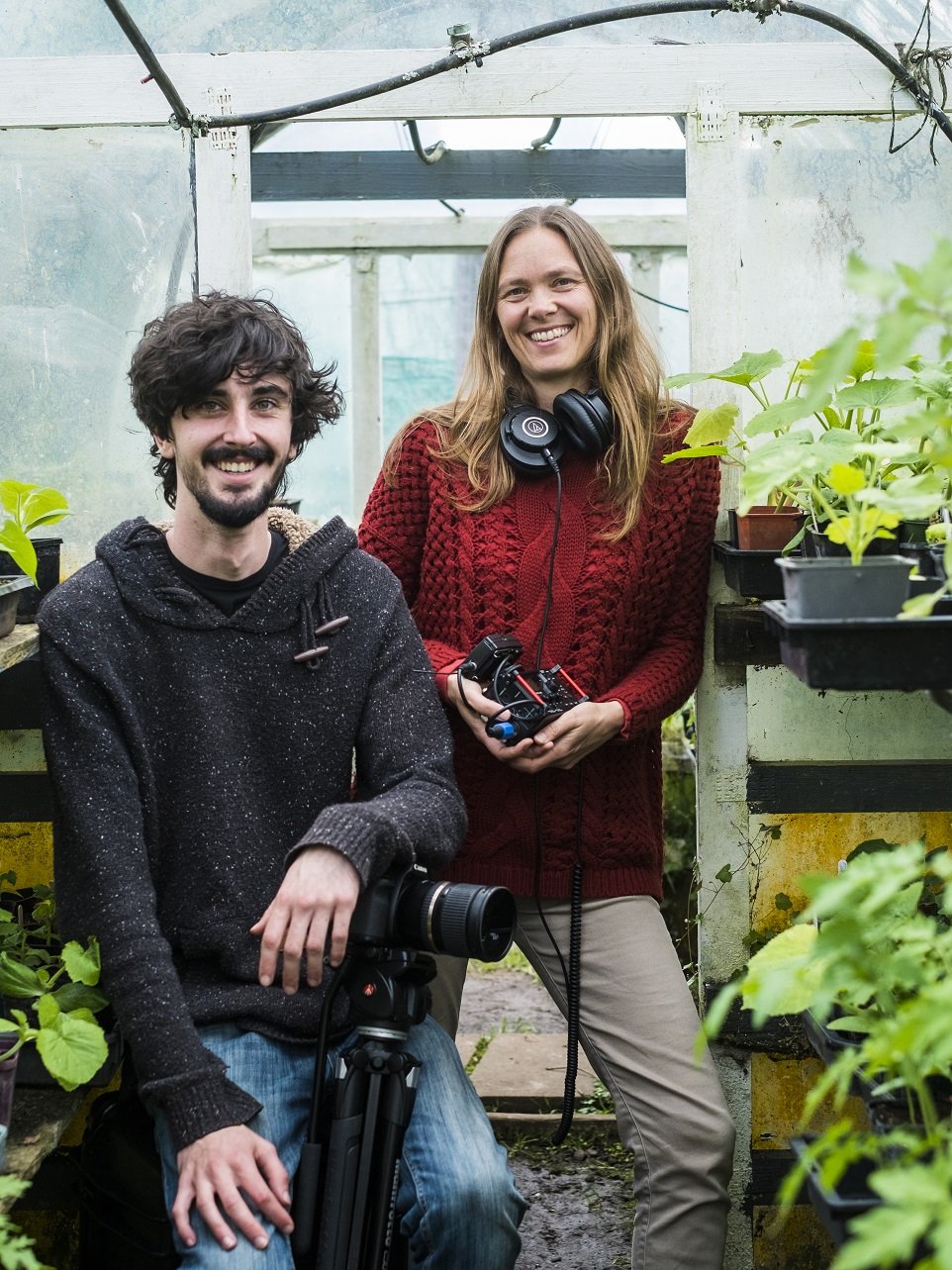The Gut Microbiome
8 tips for whole-body health
One of the most complex systems supporting your health isn’t your brain, heart, or even your immune system – it’s your gut microbiome.
Nutritional therapist Paula Sharp finds out why this internal ecosystem, composed of trillions of microorganisms, is hailed by scientists as key to health research.
We hope you enjoy this free article from OrganicNZ. Join us to access more, exclusive member-only content

Your gut microbiome is the diverse community of bacteria, viruses, fungi, and other microbes residing primarily in your large intestine.
They are microscopic, but have an enormous collective impact. They have essential roles in digesting food, modulating inflammation, and influencing brain health.
The microbiome also builds and regulates most of our immune function.
Image: DataBase Center for Life Science, Wikimedia Commons
What is the gut microbiome?
Imagine a rainforest inside your body, teeming with life. Like any ecosystem, the gut microbiome thrives on diversity and balance. This community of microorganisms works together to help you break down fibre, extract nutrients, synthesise vitamins (such as B12 and K), and produce beneficial short-chain fatty acids.
While we tend to think of bacteria as harmful, the majority living in your gut are either beneficial or neutral. These microbes co-evolved with us and perform tasks we cannot do on our own—such as fermenting non-digestible carbohydrates or keeping pathogenic (harmful) bacteria in check.
It’s estimated that the human gut contains between 300 to 1000 different species of bacteria, with every individual having a unique microbiome signature, influenced by genetics, diet, environment, and lifestyle.
The microbiome’s role in the body
Research over the past decade has dramatically changed our understanding of the gut microbiome. Once considered a passive system, it’s now seen as an active organ in its own right, interacting with nearly every physiological process.
1. Digestion and nutrient absorption
Gut microbes help break down complex carbohydrates, such as dietary fibre, that we can’t digest on our own. The fermentation of fibre by certain bacterial strains produces short-chain fatty acids (SCFAs) like acetate, propionate, and butyrate. These SCFAs are anti-inflammatory and nourish the cells lining the colon.
2. Immune system regulation
About 70% of your immune cells reside in the gut lining. A healthy microbiome helps maintain the balance between immune tolerance (not reacting to harmless substances) and defence (attacking pathogens). An imbalanced microbiome may contribute to autoimmune conditions – in which the body mistakenly attacks its own healthy cells – and chronic inflammation.
3. Gut–brain axis
The gut-brain axis describes the two-way communication between the gut and the central nervous system. Through neural, hormonal, and immunological pathways, the gut influences mental health.
Certain strains of bacteria, particularly lactobacillus and bifidobacterium produce neurotransmitters like serotonin and GABA, these improve mood and cognitive function.

Image: Jill Wellington / Pexels
However, some bacteria mimic and interfere with these neurotransmitters. E-coli, campylobacter and clostridium are some of the bacterial culprits which release inflammation causing compounds (or toxins) causing mood to dip, anxiety to increase and sleep to be compromised.
Emerging evidence even links gut health to neurodevelopmental conditions like autism spectrum disorder and degenerative diseases such as Parkinson’s disease.
What disrupts the microbiome?
Despite its resilience, the gut microbiome is highly sensitive to changes in our environment and behaviour. Modern lifestyles, particularly in industrialised nations, are often hostile to microbial diversity.
1. Dietary factors
Diets high in ultra-processed foods, added sugars, and low fibre reduce beneficial species and encourage the overgrowth of pathogenic bacteria, which are otherwise not a problem when the microbiome is balanced.
Excessive alcohol consumption and low intake of plant-based foods limit microbial diversity.

Image: Foodie Factor / Pexels
2. Medications
Antibiotics, while lifesaving, can wipe out both good and bad bacteria, potentially leading to long-term imbalance.
Medications that reduce stomach acids, NSAIDs (non-steroidal anti-inflammatory medications), and artificial sweeteners all negatively alter the gut microbiome.
3. Lifestyle stressors
Chronic stress or cortisol poisoning is felt in the gut. The stress-hormone response increases intestinal permeability (leaky gut) and impairs microbial balance. This can show up as stress diarrhoea, nervous urination, nausea and ‘tummy ache’ in the lower abdomen. Is it just butterflies in your tummy, or compromised gut health?
Poor sleep quality disrupts the circadian rhythm of gut microbes. Sedentary behaviour has also been associated with reduced microbial diversity.
Eight ways to nurture your gut microbiome
Restoring and maintaining a healthy gut doesn’t require drastic changes. Simple, evidence-based strategies such as the following can support your microbiome’s resilience and diversity:
1. Eat a diverse range of whole foods
A variety of fibre-rich foods feeds different bacterial strains. Aim for 30+ plant types per week, including vegetables, fruits, nuts, seeds, legumes, herbs, and whole grains.

Image: Oksana S / iStock
2. Prioritise prebiotics and probiotics
Prebiotics are non-digestible fibres that act as food for beneficial bacteria. Sources include garlic, onions, leeks, asparagus and bananas.
Probiotics are live bacteria found in fermented foods like yoghurt, kefir, kimchi, sauerkraut, and miso. These can help restore microbial balance, especially after antibiotic use.
3. Minimise ultra processed foods
Artificial additives, emulsifiers, and preservatives in highly processed foods harm microbial communities and contribute to metabolic dysregulation.
Ultra processed foods look like this: instant noodles, snack chips, sugary cereals, frozen chicken nuggets, processed cheese slices, fizzy drinks and snack bars.
Many of them contain MSG (monosodium glutamate), thickeners, and phosphoric acid as additives. Taste has been enhanced with lab-produced flavourings such as ‘cheese flavour’, ‘strawberry flavour’, ‘honey flavour’. And the preservatives of choice are sulphates, sodium and/or sorbates. Food labels can feel like a minefield, but if you don’t recognise what’s on the label, it can be considered ultra processed food.
4. Stay hydrated
Water is essential for maintaining a healthy gut lining and aiding fibre fermentation.
5. Move your body
Regular exercise has been linked to increased diversity and abundance of health-promoting bacterial strains.
6. Manage your stress
Mind-body techniques such as meditation, breathwork, or gentle movement like yoga can regulate the gut-brain axis and reduce inflammation.

Yoga on the beach (image: LucidSurf/istock)
7. Sleep consistently
A regular sleep schedule supports the natural circadian rhythms of your gut bacteria, which influence digestion and hormone production.
8. Consider supplementation carefully
While probiotic and prebiotic supplements can be helpful, they’re not one-size-fits-all. It’s best to consult a qualified health professional to tailor recommendations to your needs.
The microbiome and the future of health
We’re just scratching the surface of microbiome science. With emerging links to conditions as diverse as type 2 diabetes, cardiovascular disease, allergies, skin conditions, and even cancer, researchers believe the microbiome may soon be a central focus for personalised and preventive medicine.
Microbiome testing and interventions may one day guide us in choosing the best foods, therapies, or even medications based on our internal microbial profile.
The gut microbiome represents a new lens through which we can understand health, illness, and healing. It’s not about striving for perfection—but rather cultivating balance.
By eating real food, managing stress, staying hydrated, and treating your gut with respect, you can positively influence not just your digestion, but your immunity, energy levels, mood, and long-term vitality.











